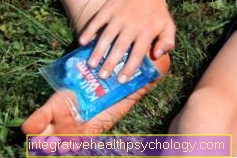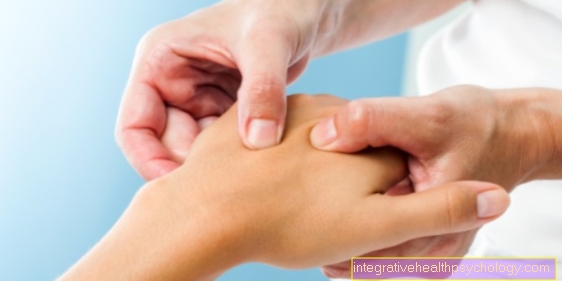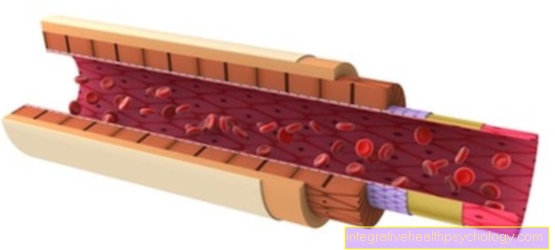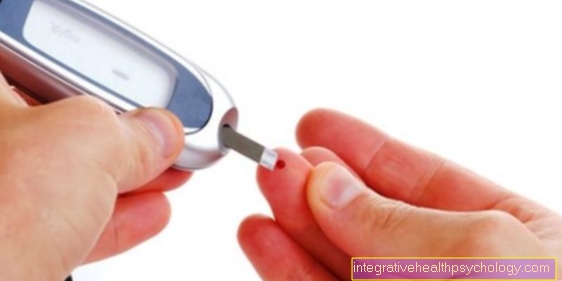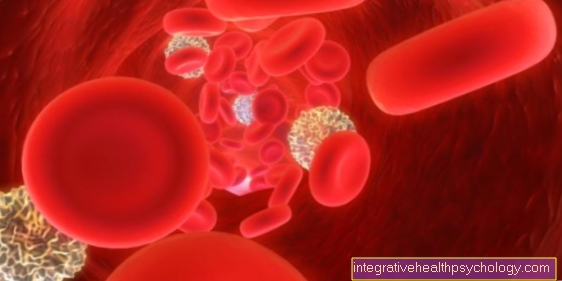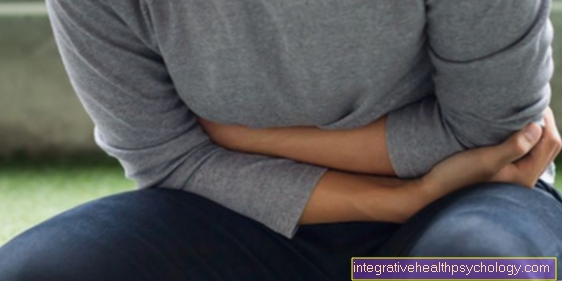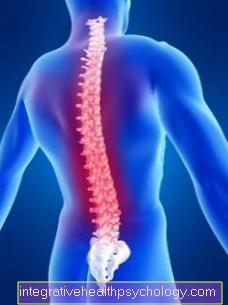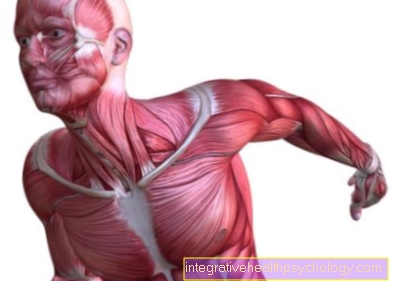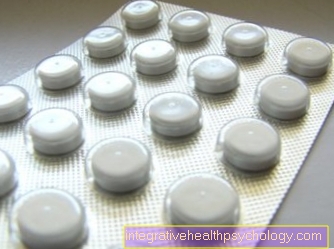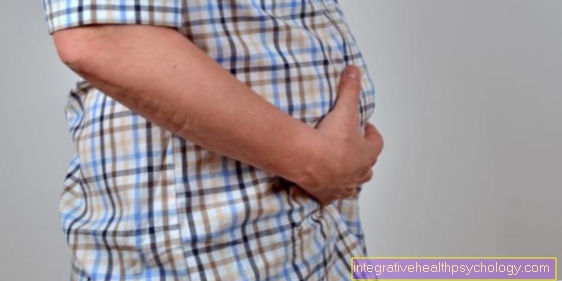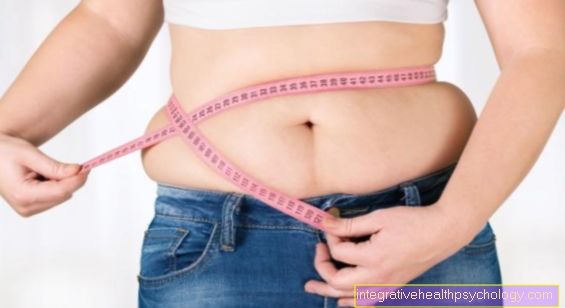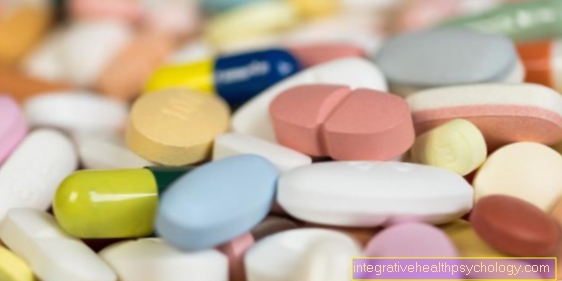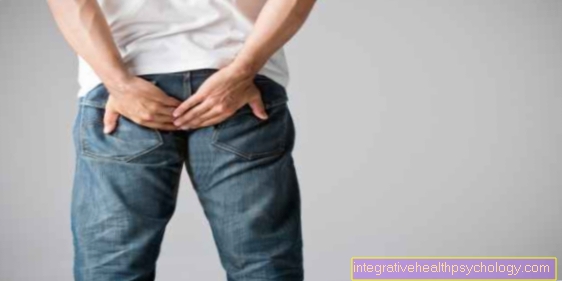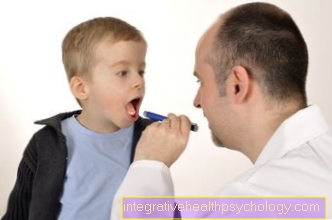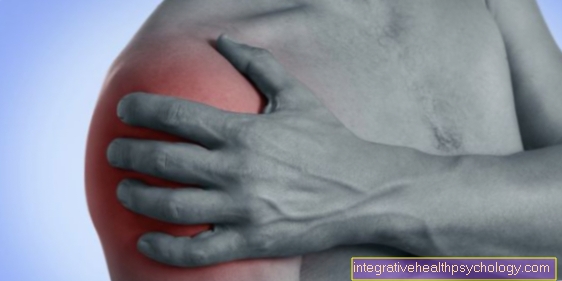Lymph node swelling after vaccination
introduction
Lymph node swelling is the swelling of one or more lymph nodes. If this occurs immediately after a vaccination (beginning a few hours to a few days after the vaccination), there may be a connection between the vaccination and the lymph node swelling.
Common locations for lymph node swelling are the neck, armpit and groin region.
However, other lymph nodes in the body can also be affected. In the case of lymph node swelling after vaccination, it is often mainly a swelling of the lymph nodes in the armpit of the vaccinated arm, in children in the groin of the vaccinated leg.
Please also read the following articles:
- Lymph node swelling in the armpit - is it dangerous?
- Lymph node swelling in the groin - is it dangerous?

Causes of lymph node swelling after vaccination
Many cells that play an important role in the body's immune system are stored in the lymph nodes.
Vaccination involves injecting pathogens into the body in a weakened form. The immune system should learn how to deal with the pathogen. A vaccination therefore serves to train the immune system.
The vaccination can produce cells that specifically recognize the surface of the affected pathogen. These cells are stored in the lymph nodes, for example, which is why lymph node swelling can occur after vaccination.
If the body is confronted with the pathogen again after the vaccination, it can fall back on the cells it has already formed and thus fight the pathogen before the disease breaks out.
Another reason for lymph node swelling after vaccination can also be infections during vaccination. By puncturing the skin, there is a low risk of other pathogens penetrating, despite prior disinfection.Typically, this leads to a significant reddening and swelling of the puncture site, the immune system also has to fight the additionally invaded pathogen and can be overloaded, which can also be presented by lymph node swelling.
You can read detailed information about this topic under: Causes of lymph node swelling
Other accompanying symptoms
A slight swelling of the lymph nodes after a vaccination can be accompanied by a few other symptoms, which also suggest an activation of the immune system (which is desirable for a vaccination).
These include local symptoms such as swelling at the injection site. In addition, a slight overheating and pain can occur in the affected area.
It is also not uncommon for a slight fever / increased temperature or fatigue and exhaustion to occur. These symptoms usually go away after a few days.
Children are often more severely affected by the symptoms that accompany vaccinations; they can also develop a somewhat higher fever and be tired, limp and whining for a few days.
Occasionally, however, the lymph node swelling can also be an expression of a vaccination complication. This can lead to an infection of the puncture site, which manifests itself in a clear reddening (often the reddening spreads within a few hours) and a significant increase in fever.
Read all about them here Vaccination side effects
Therapy of lymph node swelling after vaccination
Since lymph node swelling after vaccination is often a symptom of the desired activation of the immune system, in many cases there is no need to treat lymph node swelling.
However, accompanying symptoms such as fatigue and mild fever can be treated symptomatically. Often, physical rest for a few days is sufficient, and children are also happy to use anti-fever medication.
If the lymph node swelling is an expression of an infection, this infection should also be treated symptomatically first. The main focus is on adequate fluid intake and lowering the fever.
Antibiotics can also be used for bacterial infections. Serious vaccination complications such as allergic reactions can be treated with antihistamines (anti-allergic drugs). In the case of severe reactions up to allergic shock, emergency medical care is necessary in rare cases.
Please also read the following article: Side effects from vaccinations in the baby
How long does the lymph node swelling last?
The duration of lymph node swelling after vaccination should be about as long as the other accompanying symptoms persist.
The swelling often starts the day after the vaccination and lasts for a few days. The immune system then processed the vaccine completely, so that the lymph nodes also swell again.
If the reaction to the vaccination is excessive, the lymph node swelling may last longer, but it usually disappears after a few days to weeks. Only a serious and dangerous reaction to the vaccination can cause prolonged swelling of the lymph nodes.
Depending on the trigger, lymph node swelling lasts differently. You can read more information on this topic under: Duration of lymph node swelling
When do I have to see a doctor?
With lymph node swelling after vaccination, you do not have to see a doctor, as a certain reaction of the immune system is normal and swelling of the lymph nodes is to be expected.
However, if there are other symptoms such as severe malaise and fever (a little fever / increased temperature and a slight feeling of illness can also be normal after vaccination), a doctor should be consulted.
If the site of the vaccination is severely reddened or swollen, or if the reddening spreads over the (vaccinated) arm, for example, you must see a doctor to rule out a serious complication. You should also see a doctor if there are signs of an allergic reaction (rash, severe itching, sudden shortness of breath, circulatory shock).
Lymph node swelling after vaccination in a baby
In the first few months, babies usually receive vaccinations against rotaviruses (from 6 weeks) as well as the six-fold vaccination (tetanus, diphtheria, pertussis, Hib, poliomyelitis, hepatitis B) and the pneumococcal vaccination.
The vaccinations take place - if they are carried out according to the recommendations of the STIKO - at the age of two, three and four months, an additional vaccination takes place at the end of the first year of life respectively.
Because babies' immune systems are not as mature as those of older children and adults, more frequent vaccinations are necessary for immunity to the disease. In babies in particular, the immune system must first learn how to react to the respective vaccine, which can lead to a strong activation of the immune system and the affected immune stations in the body (e.g. lymph nodes).
Lymph node swelling after vaccination is therefore not uncommon in babies. More often, however, the systemic (affecting the whole body) consequences of vaccination are felt. These include fever and fatigue in the child.
The babies are often tired and limp for a few days, they are also often tearful, and their appetite can be reduced for a few days. The fever that follows the vaccination can be treated with antipyretic drugs such as paracetamol and ibuprofen (usually in the form of suppositories in babies).
Read more on this topic at: Side effects from vaccinations in the baby

